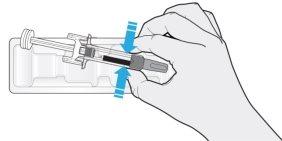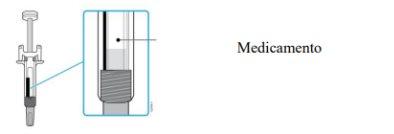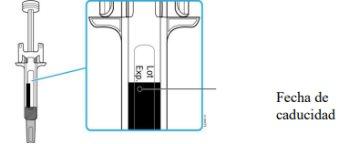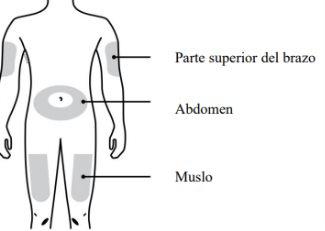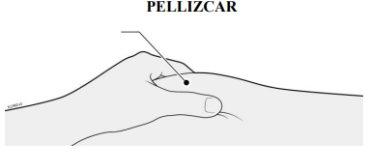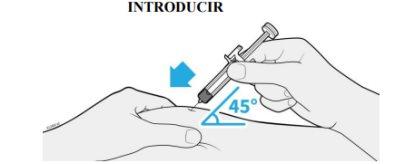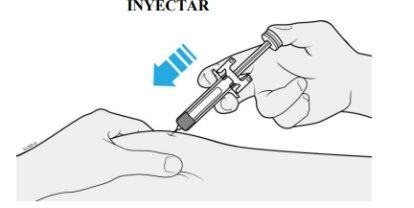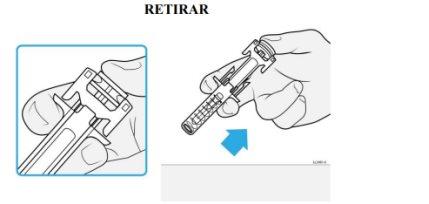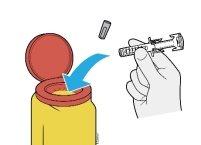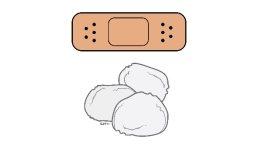
WEZENLA 90 mg SOLUTION FOR INJECTION IN PRE-FILLED SYRINGE


How to use WEZENLA 90 mg SOLUTION FOR INJECTION IN PRE-FILLED SYRINGE
Translated with AI
This page provides general information and does not replace a doctor’s consultation. Always consult a doctor before taking any medication. Seek urgent medical care if symptoms are severe.
Show originalContents of the leaflet
Introduction
Package Leaflet: Information for the Patient
WEZENLA 45mg solution for injection in pre-filled syringe
WEZENLA 90mg solution for injection in pre-filled syringe
ustekinumab
This medicine is subject to additional monitoring, which will allow for quick identification of new safety information. You can help by reporting any side effects you may get. The last section of the leaflet contains information on how to report side effects.
Read all of this leaflet carefully before you start using this medicine because it contains important information for you.
This leaflet has been written for the person taking the medicine. If you are the parent or caregiver of a child who will be given WEZENLA, please read this information carefully.
- Keep this leaflet, you may need to read it again.
- If you have any further questions, ask your doctor or pharmacist.
- This medicine has been prescribed for you only. Do not pass it on to others. It may harm them, even if their signs of illness are the same as yours.
- If you get any side effects, talk to your doctor or pharmacist. This includes any possible side effects not listed in this leaflet. See section 4.
Contents of the pack
- What is WEZENLA and what is it used for
- What you need to know before you use WEZENLA
- How to use WEZENLA
- Possible side effects
- Storage of WEZENLA
- Contents of the pack and other information
1. What is WEZENLA and what is it used for
What is WEZENLA
WEZENLA contains the active substance “ustekinumab”, a monoclonal antibody. Monoclonal antibodies are proteins that identify and bind to specific proteins in the body.
WEZENLA belongs to a group of medicines called “immunosuppressants”. These medicines work by weakening part of the immune system.
What is WEZENLA used for
WEZENLA is used to treat the following inflammatory diseases:
- Plaque psoriasis - in adults and children aged 6 years and over
- Psoriatic arthritis - in adults
- Moderate to severe Crohn's disease - in adults
Plaque psoriasis
Plaque psoriasis is a skin disease that causes inflammation affecting the skin and nails. WEZENLA reduces inflammation and other signs of the disease.
WEZENLA is used in adults with moderate to severe plaque psoriasis who cannot use ciclosporin, methotrexate, or phototherapy, or where these treatments do not work.
WEZENLA is used in children and adolescents aged 6 years and over with moderate to severe plaque psoriasis who are unable to tolerate phototherapy or other systemic therapies or where these treatments do not work.
Psoriatic arthritis
Psoriatic arthritis is an inflammatory disease of the joints, usually accompanied by psoriasis. If you have active psoriatic arthritis, you will first receive other medicines. If you do not respond well to these medicines, you may be treated with WEZENLA to:
- Reduce the signs and symptoms of your disease.
- Improve your physical function.
- Reduce damage to your joints.
Crohn's disease
Crohn's disease is an inflammatory disease of the intestine. If you have Crohn's disease, you will first be given other medicines. If you do not respond adequately or cannot tolerate these medicines, you may be given WEZENLA to reduce the signs and symptoms of your disease.
2. What you need to know before you use WEZENLA
Do not use WEZENLA
- If you are allergic to ustekinumabor any of the other ingredients of this medicine (listed in section 6).
- If you have an active infectionthat your doctor thinks is important.
If you are not sure if any of the above applies to you, talk to your doctor or pharmacist before using WEZENLA.
Warnings and precautions
Talk to your doctor or pharmacist before starting WEZENLA. Your doctor will check how you are before each treatment. Make sure you tell your doctor about any illness you have before each treatment. Your doctor will also ask if you have recently been near someone who may have tuberculosis. Your doctor will examine you and do a test to check for tuberculosis before you start using WEZENLA. If your doctor thinks you are at risk of tuberculosis, you may be given medicines to treat it.
Watch for serious side effects
WEZENLA may cause serious side effects, including allergic reactions and infections. You should be aware of certain signs of illness while you are using WEZENLA. See the complete list of these side effects in “Serious side effects” in section 4.
Tell your doctor before using WEZENLA:
- If you have ever had an allergic reaction to WEZENLA.Check with your doctor if you are not sure.
- If you have ever had any type of cancer– this is because immunosuppressants like WEZENLA weaken part of the immune system. This may increase the risk of having cancer.
- If you have received treatment for psoriasis with other biologics (a medicine made from a biological source and usually given by injection)– the risk of having cancer may be higher.
- If you have had a recent infection.
- If you have any new or changing lesionswithin the area of psoriasis or on intact skin.
- If you are taking any other treatment for psoriasis and/or psoriatic arthritis– such as any other immunosuppressant or phototherapy (when your body is treated with a type of ultraviolet light (UV)). These treatments may also weaken part of the immune system. It has not been studied whether these treatments can be used together with WEZENLA. However, it may increase the likelihood of suffering from diseases related to a weaker immune system.
- If you are receiving or have ever received allergy shots– it is not known if WEZENLA can affect these treatments.
- If you are 65 years of age or older– you are more likely to get infections.
If you are not sure if any of the above applies to you, talk to your doctor or pharmacist before using WEZENLA.
Some patients have experienced lupus-like reactions during treatment with ustekinumab, including cutaneous lupus or lupus-like syndrome. Talk to your doctor immediately if you experience a red, raised, and scaly skin rash, sometimes with a darker border, in areas of skin exposed to the sun or if accompanied by joint pain.
Heart attacks and strokes
In a study of patients with psoriasis treated with ustekinumab, heart attacks and strokes have been observed. Your doctor will regularly check your risk factors for heart disease and stroke to ensure they are being treated properly. Seek medical attention immediately if you experience chest pain, weakness, or unusual sensation on one side of the body, facial paralysis, or abnormalities in speech or vision.
Children and adolescents
WEZENLA is not recommended for use in children under 6 years of age with psoriasis or in children under 18 years of age with psoriatic arthritis or Crohn's disease, as it has not been studied in this age group.
Using WEZENLA with other medicines, vaccines
Tell your doctor or pharmacist:
- If you are using, have recently used, or might use other medicines.
- If you have been vaccinated recently or are going to have a vaccination.Certain types of vaccines (live vaccines) should not be given while you are using WEZENLA.
- If you received WEZENLA during pregnancy, tell your baby's doctor about your treatment with WEZENLA before your baby receives any vaccination, including live vaccines such as the BCG vaccine (used to prevent tuberculosis).Live vaccines are not recommended for your baby in the first 12 months after birth if you received WEZENLA during pregnancy, unless your baby's doctor recommends otherwise.
Pregnancy and breastfeeding
- If you are pregnant or breast-feeding, think you may be pregnant, or are planning to have a baby, ask your doctor for advice before taking this medicine.
- No increased risk of birth defects has been seen in babies exposed to WEZENLA in the womb.However, there is limited experience with WEZENLA in pregnant women. Therefore, it is preferable to avoid the use of WEZENLA during pregnancy.
- If you are a woman of childbearing age, you are advised to avoid becoming pregnant and to use adequate contraceptive measures while you are using WEZENLA and for at least 15 weeks after the last treatment with WEZENLA.
- WEZENLA may pass through the placenta to the fetus.If you received WEZENLA during pregnancy, your baby may have a higher risk of getting an infection.
- It is important that you inform your baby's doctors and other healthcare professionals if you received WEZENLA during your pregnancy before your baby receives any vaccination.Live vaccines, such as the BCG vaccine (used to prevent tuberculosis), are not recommended for your baby in the first 12 months after birth if you received WEZENLA during pregnancy, unless your baby's doctor recommends otherwise.
- Ustekinumab may be excreted in breast milk in very small amounts.If you are breast-feeding or plan to breast-feed, tell your doctor. You and your doctor will decide whether you should breast-feed or use WEZENLA. You should not do both.
Driving and using machines
WEZENLA has no or negligible influence on the ability to drive and use machines.
3. How to use WEZENLA
WEZENLA should be used under the guidance and supervision of a doctor with experience in the treatment of the conditions for which WEZENLA is indicated.
Always use this medicine exactly as your doctor has told you. If you are not sure, check with your doctor. Ask your doctor when you should have the injections and about follow-up appointments.
How much WEZENLA is given
Your doctor will decide how much WEZENLA you need to use and how long the treatment will last.
Adults aged 18 years and over
Psoriasis or psoriatic arthritis
- The recommended starting dose is 45 mg of WEZENLA.Patients weighing more than 100 kilograms (kg) may start with a dose of 90 mg instead of 45 mg.
- After the initial dose, you will receive the next dose 4 weeks later and then every 12 weeks.The following doses are usually the same as the starting dose.
Crohn's disease
- During treatment, your doctor will give you the first dose of approximately 6 mg/kg of WEZENLA through a drip in a vein in your arm (intravenous infusion).After the initial dose, you will receive the next dose of 90 mg of WEZENLA 8 weeks later and then every 12 weeks, given as an injection under the skin (“subcutaneously”).
- In some patients, after the first injection under the skin, 90 mg of WEZENLA will be given every 8 weeks.Your doctor will decide when you should receive the next dose.
Children and adolescents aged 6 years and over
Psoriasis
- Your doctor will tell you the correct dose for you, including the amount (volume) of WEZENLA to inject to give the correct dose.The correct dose for you will depend on your body weight at the time of each dose.
- A 45 mg vial is available for children who need to receive less than the full dose of 45 mg.
- If you weigh less than 60 kg, the recommended dose is 0.75 mg of WEZENLA per kilogram of body weight.
- If you weigh between 60 kg and 100 kg, the recommended dose is 45 mg of WEZENLA.
- If you weigh more than 100 kg, the recommended dose is 90 mg of WEZENLA.
- After the initial dose, you will receive the next dose 4 weeks later, and then every 12 weeks.
How WEZENLA is given
- WEZENLA is given as an injection under the skin (“subcutaneously”).At the start of your treatment, medical staff or nurses may give you the injection.
- However, you and your doctor may decide that you can give yourself the injection of WEZENLA.In this case, you will be trained on how to inject WEZENLA yourself.
- For instructions on how to inject WEZENLA, see “Instructions for use” at the end of this leaflet.
Talk to your doctor if you have any questions about how to inject yourself.
If you use more WEZENLA than you should
If you have used or been given too much WEZENLA, talk to your doctor or pharmacist immediately. Always carry the medicine box with you, even if it is empty.
If you forget to use WEZENLA
If you miss a dose, talk to your doctor or pharmacist. Do not take a double dose to make up for forgotten doses.
If you stop using WEZENLA
Stopping WEZENLA is not dangerous. However, if you stop using it, your symptoms may come back.
If you have any other questions about using this medicine, ask your doctor or pharmacist.
4. Possible Adverse Effects
Like all medicines, this medicine can cause adverse effects, although not all people suffer from them.
Severe Adverse Effects
Some patients may have severe adverse effects that may require urgent treatment.
Allergic Reactions – these may require urgent treatment. Contact your doctor or get emergency medical help immediately if you notice any of the following signs.
- Severe allergic reactions ("anaphylaxis") are rare in the population using ustekinumab (may affect up to 1 in 1,000 people). The signs include:
- difficulty breathing and swallowing
- low blood pressure, which can cause dizziness or mild headaches
- swelling of the face, lips, mouth, or throat.
- Common signs of an allergic reaction include skin rash and hives (these may affect up to 1 in 100 people).
In rare cases, allergic reactions at the lung level and lung inflammation have been reported in patients treated with ustekinumab. Inform your doctor immediately if you have symptoms such as cough, difficulty breathing, and fever.
If you have a severe allergic reaction, your doctor may decide that you should not use WEZENLA again.
Infections – these may require urgent treatment. Contact your doctor immediately if you notice any of these signs.
- Nose or throat infections and the common cold are frequent (may affect up to 1 in 10 people)
- Chest infections are uncommon (may affect up to 1 in 100 people)
- Inflammation of the tissues under the skin ("cellulitis") is uncommon (may affect up to 1 in 100 people)
- Herpes (a type of painful rash with blisters) is uncommon (may affect up to 1 in 100 people)
WEZENLA may affect your ability to fight infections. Some of them could become serious and be caused by viruses, fungi, bacteria (including tuberculosis), or parasites, and include infections that occur mainly in people with a weakened immune system (opportunistic infections). Opportunistic infections of the brain (encephalitis, meningitis), lungs, and eyes have been reported in patients receiving treatment with ustekinumab.
You should watch for signs of infection while using WEZENLA. These include:
- fever, flu-like symptoms, night sweats, weight loss
- feeling tired or having difficulty breathing; cough that does not go away
- having hot, red, and painful skin or having a painful skin rash with blisters
- burning when urinating
- diarrhea
- visual impairment or loss of vision
- headache, neck stiffness, photosensitivity, nausea, or confusion.
Communicate with your doctor immediately if you notice any of these signs of infection, as they may be signs of infections such as chest infections, skin infections, herpes, or opportunistic infections that could have serious complications. You should also inform your doctor if you have any type of infection that does not go away or comes back. Your doctor may decide that you should not use WEZENLA until the infection goes away. Also, contact your doctor if you have any open cuts or ulcers that could become infected.
Skin Shedding – increased redness and skin shedding over a large area of the body may be symptoms of erythrodermic psoriasis or exfoliative dermatitis, which are serious skin disorders. If you notice any of these symptoms, you should inform your doctor immediately.
Other Adverse Effects
Frequent Adverse Effects(may affect up to 1 in 10 people):
- Diarrhea
- Nausea
- Vomiting
- Feeling tired
- Feeling dizzy
- Headache
- Itching ("pruritus")
- Back, muscle, or joint pain
- Sore throat
- Redness and pain at the injection site
- Sinusitis
Uncommon Adverse Effects(may affect up to 1 in 100 people):
- Dental infections
- Vaginal yeast infections
- Depression
- Nasal congestion or stuffiness
- Bleeding, bruising, hardening, swelling, and itching at the injection site
- Feeling weak
- Drooping eyelid and sinking of the muscles on one side of the face ("facial paralysis" or "Bell's palsy"), which is usually temporary
- A change in psoriasis with redness and new small, yellow, or white skin blisters, sometimes accompanied by fever (pustular psoriasis)
- Skin peeling (skin exfoliation)
- Acne
Rare Adverse Effects(may affect up to 1 in 1,000 people):
- Redness and skin shedding over a large area of the body, which can cause itching or pain (exfoliative dermatitis). Similar symptoms may develop as a natural change in psoriasis symptoms (erythrodermic psoriasis)
- Inflammation of small blood vessels, which can cause a skin rash with small red or purple bumps, fever, or joint pain (vasculitis)
Very Rare Adverse Effects(may affect up to 1 in 10,000 people):
- Blisters on the skin, which can be red and cause itching and pain (bullous pemphigoid)
- Cutaneous lupus or lupus-like syndrome (red, raised, and scaly skin rash in sun-exposed areas, possibly accompanied by joint pain).
Reporting Adverse Effects
If you experience any type of adverse effect, consult your doctor or pharmacist, even if it is a possible adverse effect that is not listed in this leaflet. You can also report them directly through the national reporting system included in Appendix V. By reporting adverse effects, you can contribute to providing more information on the safety of this medicine.
5. Storage of WEZENLA
- Keep this medicine out of the sight and reach of children.
- Store in a refrigerator (between 2°C and 8°C). Do not freeze.
- Store the pre-filled syringe in the outer packaging to protect it from light.
- If necessary, individual pre-filled syringes of WEZENLA can also be stored at room temperature up to 30°C for a maximum single period of up to 30 days in their original carton to protect them from light. Note the date when the pre-filled syringe is first removed from the refrigerator and the date when it must be discarded. The discard date should not exceed the original expiry date printed on the carton. Once a syringe has been stored at room temperature (up to a maximum of 30°C), it should not be stored in the refrigerator again. Discard the syringe if it is not used within 30 days of storage at room temperature or from the original expiry date, whichever is earlier.
- Do not shake WEZENLA pre-filled syringes. Prolonged vigorous shaking may damage the product.
Do not use this medicine:
- After the expiry date stated on the label and carton after "EXP". The expiry date is the last day of the month indicated.
- If the liquid changes color, is cloudy, or has foreign particles floating in it (see section 6 "Appearance of WEZENLA and package contents").
- If you know or believe that it has been exposed to extreme temperatures (such as accidental heating or freezing).
- If the product has been shaken vigorously.
WEZENLA is for single use. You should discard any unused product left in the syringe. Medicines should not be disposed of via wastewater or household waste. Ask your pharmacist how to dispose of the packaging and medicines you no longer need. This will help protect the environment.
6. Container Contents and Additional Information
Composition of WEZENLA
- The active ingredient is ustekinumab. Each prefilled syringe contains 45 mg of ustekinumab in 0.5 ml or 90 mg of ustekinumab in 1 ml.
- The other components are L-histidine, L-histidine monohydrate hydrochloride, polysorbate 80, sucrose, and water for injectable preparations.
Appearance of WEZENLA and Container Contents
WEZENLA is a clear to opalescent injectable solution, colorless to light yellow. It is presented in a container containing 1 prefilled syringe of 1 ml glass. Each prefilled syringe contains 45 mg of ustekinumab in 0.5 ml or 90 mg of ustekinumab in 1 ml of injectable solution.
Marketing Authorization Holder and Manufacturer
Amgen Technology (Ireland) UC,
Pottery Road,
Dun Laoghaire,
Co Dublin,
Ireland
Marketing Authorization Holder
Amgen Technology (Ireland) UC,
Pottery Road,
Dun Laoghaire,
Co Dublin,
Ireland
Manufacturer
Amgen NV
Telecomlaan 5-7
1831 Diegem
Belgium
You can request more information about this medication by contacting the local representative of the marketing authorization holder:
België/Belgique/Belgien s.a. Amgen n.v. Tél/Tel: +32 (0)2 7752711 | Lietuva Amgen Switzerland AG Vilniaus filialas Tel: +370 5 219 7474 |
| Luxembourg/Luxemburg s.a. Amgen Belgique/Belgien Tél/Tel: +32 (0)2 7752711 |
Ceská republika Amgen s.r.o. Tel: +420 221 773 500 | Magyarország Amgen Kft. Tel.: +36 1 35 44 700 |
Danmark Amgen, filial af Amgen AB, Sverige Tlf.: +45 39617500 | Malta Amgen S.r.l. Italy Tel: +39 02 6241121 |
Deutschland Amgen GmbH Tel: +49 89 1490960 | Nederland Amgen B.V. Tel: +31 (0)76 5732500 |
Eesti Amgen Switzerland AG Vilniaus filialas Tel: +372 586 09553 | Norge Amgen AB Tlf: +47 23308000 |
Ελλάδα Amgen Ελλάς Φαρμακευτική Ε.Π.Ε. Τηλ: +30 210 3447000 | Österreich Amgen GmbH Tel: +43 (0)1 50 217 |
España Amgen S.A. Tel: +34 93 600 18 60 | Polska Amgen Biotechnologia Sp. z o.o. Tel.: +48 22 581 3000 |
France Amgen S.A.S. Tél: +33 (0)9 69 363 363 | Portugal Amgen Biofarmacêutica, Lda. Tel: +351 21 4220606 |
Hrvatska Amgen d.o.o. Tel: +385 (0)1 562 57 20 | România Amgen România SRL Tel: +4021 527 3000 |
Ireland Amgen Ireland Limited Tel: +353 1 8527400 | Slovenija AMGEN zdravila d.o.o. Tel: +386 (0)1 585 1767 |
Ísland Vistor hf. Sími: +354 535 7000 | Slovenská republika Amgen Slovakia s.r.o. Tel: +421 2 321 114 49 |
Italia Amgen S.r.l. Tel: +39 02 6241121 | Suomi/Finland Amgen AB, sivuliike Suomessa/Amgen AB, filial i Finland Puh/Tel: +358 (0)9 54900500 |
Kύπρος C.A. Papaellinas Ltd Τηλ: +357 22741 741 | Sverige Amgen AB Tel: +46 (0)8 6951100 |
Latvija Amgen Switzerland AG Rigas filiale Tel: +371 257 25888 |
Date of Last Revision of this Leaflet:
Other Sources of Information
Detailed information on this medicinal product is available on the European Medicines Agency website: http://www.ema.europa.eu.
--------------------------------------------------------------------------------------------------------------------
INSTRUCTIONS FOR USE
These "Instructions for Use" contain information on how to inject WEZENLA with a prefilled syringe.
This prefilled syringe administers WEZENLA via a subcutaneous injection. Refer to the package leaflet for information on the medication.
| ||
1 Important Information You Should Know Before Injecting WEZENLA | |
Dose:
|
Using the WEZENLA Prefilled Syringe:
- It is important that you do not attempt to administer the injection unless you have been trained to do so by your doctor or a healthcare professional.
- In children 12 years of age or older with psoriasis and a weight of 60 kg or more, it is recommended that WEZENLA be administered by a parent or caregiver or under their supervision.
- Do notuse the prefilled syringe if the box is damaged or if the seal is broken.
- Do notuse the prefilled syringe past the expiration date shown on the label.
- Do notshake the prefilled syringe.
- Do notremove the needle cap from the prefilled syringe until you are ready to inject.
- Do notuse the prefilled syringe if it has been frozen.
- Do notuse the prefilled syringe if it has been dropped onto a hard surface. Although it may not be visible to the naked eye, some part of the syringe may be broken. Use a new prefilled syringe, if available, and contact your doctor or healthcare professional.

2 Preparation for Injection of WEZENLA |
2a Remove the prefilled syringe from the box by holding the body. |
|
|
2b Wait 30 minutes for the prefilled syringe to reach room temperature. |
WAIT 30 minutes |
|
2c Gather the necessary objects for the injection and place them on a clean, well-lit surface. |
|
|
|
|
|
|
3 Preparation for Injection |
3a Inspect the medication. It should be a clear to opalescent solution, colorless to light yellow. |
|
|
3b Check the expiration date (EXP) and inspect the prefilled syringe. |
|
|
3c Inject into one of these areas. |
|
|
3d Wash your hands well with soap and water. |
3e Clean the injection site with an alcohol swab. |
|
4 Injection of WEZENLA |
4a Pull the needle cap off while holding the syringe by the body. |
|
|
4b Pinch the skin at the injection site before injection. |
|
|
|
4c Insert the needle into the pinched skin. |
|
|
4d Slowly press the plunger head down until it is completely between the needle shield clips. |
|
4e Maintain pressure on the plunger head and remove the needle from the skin. |
|
|
If a second injection is needed… |
4f Repeat steps 2a-4e if a second injection is required. |
|
|
5 End of Injection and Disposal of WEZENLA
|
5a Dispose of the used prefilled syringe and needle cap in the sharps container. |
|
|

5b Check the injection site. |
|
|
|
You should dispose of any unused product that remains in the syringe. Medicines should not be disposed of via wastewater or household waste. Ask your pharmacist how to dispose of medicines no longer required. This will help protect the environment.
- Country of registration
- Active substance
- Prescription requiredYes
- Manufacturer
- This information is for reference only and does not constitute medical advice. Always consult a doctor before taking any medication. Oladoctor is not responsible for medical decisions based on this content.
- Alternatives to WEZENLA 90 mg SOLUTION FOR INJECTION IN PRE-FILLED SYRINGEDosage form: INJECTABLE PERFUSION, 130 mgActive substance: ustekinumabManufacturer: Accord Healthcare S.L.U.Prescription requiredDosage form: INJECTABLE, 45 mgActive substance: ustekinumabManufacturer: Accord Healthcare S.L.U.Prescription requiredDosage form: INJECTABLE, 90 mgActive substance: ustekinumabManufacturer: Accord Healthcare S.L.U.Prescription required
Online doctors for WEZENLA 90 mg SOLUTION FOR INJECTION IN PRE-FILLED SYRINGE
Discuss questions about WEZENLA 90 mg SOLUTION FOR INJECTION IN PRE-FILLED SYRINGE, including use, safety considerations and prescription review, subject to medical assessment and local regulations.
Frequently Asked Questions








